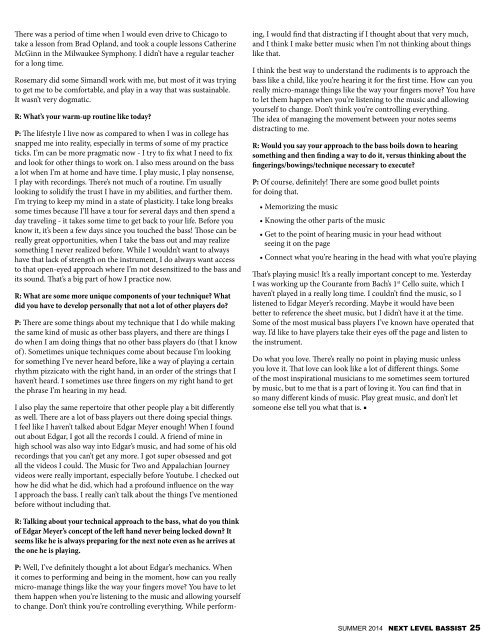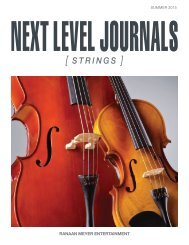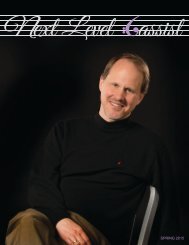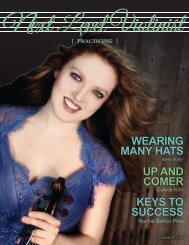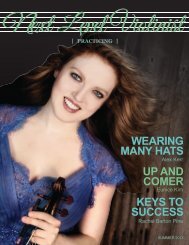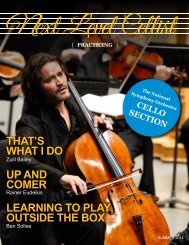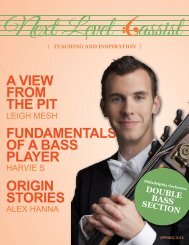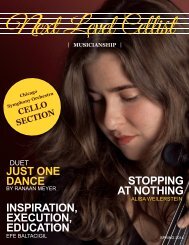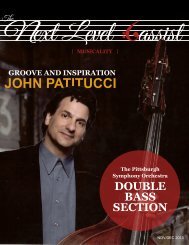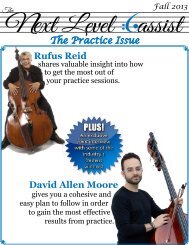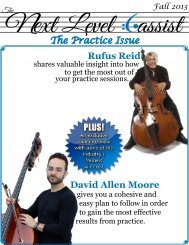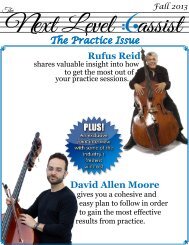Next Level Bassist Left Hand
Summer 2014 edition of Next Level Bassist. Left hand techniques and exercises by Nicholas Walker, Jordan Anderson, Paul Kowert. Section Spotlight on Cleveland Orchestra. Up and Comers Tim Dilenschneider and Jordan Morton
Summer 2014 edition of Next Level Bassist. Left hand techniques and exercises by Nicholas Walker, Jordan Anderson, Paul Kowert. Section Spotlight on Cleveland Orchestra. Up and Comers Tim Dilenschneider and Jordan Morton
Create successful ePaper yourself
Turn your PDF publications into a flip-book with our unique Google optimized e-Paper software.
There was a period of time when I would even drive to Chicago to<br />
take a lesson from Brad Opland, and took a couple lessons Catherine<br />
McGinn in the Milwaukee Symphony. I didn’t have a regular teacher<br />
for a long time.<br />
Rosemary did some Simandl work with me, but most of it was trying<br />
to get me to be comfortable, and play in a way that was sustainable.<br />
It wasn’t very dogmatic.<br />
R: What’s your warm-up routine like today?<br />
P: The lifestyle I live now as compared to when I was in college has<br />
snapped me into reality, especially in terms of some of my practice<br />
ticks. I’m can be more pragmatic now - I try to fix what I need to fix<br />
and look for other things to work on. I also mess around on the bass<br />
a lot when I’m at home and have time. I play music, I play nonsense,<br />
I play with recordings. There’s not much of a routine. I’m usually<br />
looking to solidify the trust I have in my abilities, and further them.<br />
I’m trying to keep my mind in a state of plasticity. I take long breaks<br />
some times because I’ll have a tour for several days and then spend a<br />
day traveling - it takes some time to get back to your life. Before you<br />
know it, it’s been a few days since you touched the bass! Those can be<br />
really great opportunities, when I take the bass out and may realize<br />
something I never realized before. While I wouldn’t want to always<br />
have that lack of strength on the instrument, I do always want access<br />
to that open-eyed approach where I’m not desensitized to the bass and<br />
its sound. That’s a big part of how I practice now.<br />
R: What are some more unique components of your technique? What<br />
did you have to develop personally that not a lot of other players do?<br />
P: There are some things about my technique that I do while making<br />
the same kind of music as other bass players, and there are things I<br />
do when I am doing things that no other bass players do (that I know<br />
of). Sometimes unique techniques come about because I’m looking<br />
for something I’ve never heard before, like a way of playing a certain<br />
rhythm pizzicato with the right hand, in an order of the strings that I<br />
haven’t heard. I sometimes use three fingers on my right hand to get<br />
the phrase I’m hearing in my head.<br />
I also play the same repertoire that other people play a bit differently<br />
as well. There are a lot of bass players out there doing special things.<br />
I feel like I haven’t talked about Edgar Meyer enough! When I found<br />
out about Edgar, I got all the records I could. A friend of mine in<br />
high school was also way into Edgar’s music, and had some of his old<br />
recordings that you can’t get any more. I got super obsessed and got<br />
all the videos I could. The Music for Two and Appalachian Journey<br />
videos were really important, especially before Youtube. I checked out<br />
how he did what he did, which had a profound influence on the way<br />
I approach the bass. I really can’t talk about the things I’ve mentioned<br />
before without including that.<br />
P: Well, I’ve definitely thought a lot about Edgar’s mechanics. When<br />
it comes to performing and being in the moment, how can you really<br />
micro-manage things like the way your fingers move? You have to let<br />
them happen when you’re listening to the music and allowing yourself<br />
to change. Don’t think you’re controlling everything. While performing,<br />
I would find that distracting if I thought about that very much,<br />
and I think I make better music when I’m not thinking about things<br />
like that.<br />
I think the best way to understand the rudiments is to approach the<br />
bass like a child, like you’re hearing it for the first time. How can you<br />
really micro-manage things like the way your fingers move? You have<br />
to let them happen when you’re listening to the music and allowing<br />
yourself to change. Don’t think you’re controlling everything.<br />
The idea of managing the movement between your notes seems<br />
distracting to me.<br />
R: Would you say your approach to the bass boils down to hearing<br />
something and then finding a way to do it, versus thinking about the<br />
fingerings/bowings/technique necessary to execute?<br />
P: Of course, definitely! There are some good bullet points<br />
for doing that.<br />
• Memorizing the music<br />
• Knowing the other parts of the music<br />
• Get to the point of hearing music in your head without<br />
seeing it on the page<br />
• Connect what you’re hearing in the head with what you’re playing<br />
That’s playing music! It’s a really important concept to me. Yesterday<br />
I was working up the Courante from Bach’s 1 st Cello suite, which I<br />
haven’t played in a really long time. I couldn’t find the music, so I<br />
listened to Edgar Meyer’s recording. Maybe it would have been<br />
better to reference the sheet music, but I didn’t have it at the time.<br />
Some of the most musical bass players I’ve known have operated that<br />
way. I’d like to have players take their eyes off the page and listen to<br />
the instrument.<br />
Do what you love. There’s really no point in playing music unless<br />
you love it. That love can look like a lot of different things. Some<br />
of the most inspirational musicians to me sometimes seem tortured<br />
by music, but to me that is a part of loving it. You can find that in<br />
so many different kinds of music. Play great music, and don’t let<br />
someone else tell you what that is. ■<br />
R: Talking about your technical approach to the bass, what do you think<br />
of Edgar Meyer’s concept of the left hand never being locked down? It<br />
seems like he is always preparing for the next note even as he arrives at<br />
the one he is playing.<br />
SUMMER 2014 NEXT LEVEL BASSIST 25


